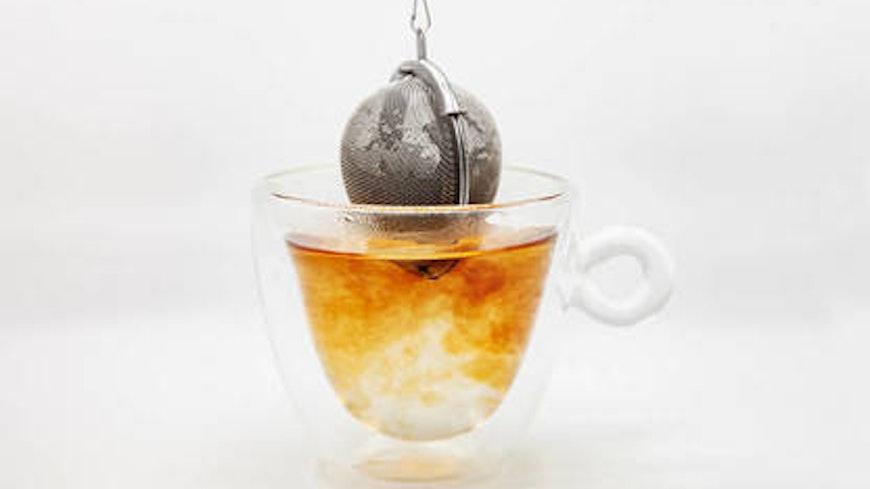Brewing a pot of loose-leaf tea isn’t nearly as convenient as dunking a little bag of your favourite blend in a mug of hot water. Unfortunately, this convenience can come at a cost.
How are tea bags sealed?
Many tea bags contain a thermoplastic such as polypropylene (PP, the recyclable plastic coded “5”) or plant-based polylactic acid (PLA, “7”).
The plastics are food-grade but that doesn’t mean they break down easily (see “Composting clues”). Even though PLA is plant-based, there’s no guarantee your compost heap will do a proper job of recycling it back to nature.
For PLA to degrade entirely, the temperature needs to be higher than what a domestic system can reliably produce. Even in an industrial composting facility, with a consistent temperature of 58°C, it can take six months for PLA to degrade completely.
We asked 17 distributors of herbal and black tea brands if their tea bags contained plastic. Six used polypropylene to seal their bags. Most of the others used PLA. Read their responses here.
Switching to loose leaf tea
You can reduce the waste from your tea consumption by switching to a loose-leaf blend. You might also save money. Of the eight black teas we priced, three were cheaper in loose-leaf form: Dilmah, T2, T Leaf and Zealong.
With Choysa, there was no difference in price, but Bell, Chanui and Twinings charged more, gram for gram, for their loose-leaf options than for the same blend bagged.
Seeing as loose-leaf isn’t packaged as individual servings, it seems logical that manufacturing costs would be lower, and you might expect those savings to trickle down to the consumer.
One reason bags may be cheaper is if they’re filled with “fannings” or “dust”. These bits and pieces were once considered leftovers of the manufacturing process and would have been thrown out or used as mulch. The advent of the tea bag, however, meant that even scraps too tiny to be contained by the mesh of an infuser or strainer could be packaged as a marketable product.

You can reduce waste by switching to loose-leaf tea - and you might save money too.
Smaller pieces aren’t always a by-product, though. Manufacturers may use a finer cut so that more sap can react with oxygen in the air to develop a stronger flavour, colour and aroma. This means a little will go a long way – so you’ll usually get a more robust brew from a teaspoonful of fannings than you would from the equivalent amount of whole leaves.
Seal the deal
If you absolutely can’t do without tea bags, choose tagless ones (the paper and string consume more resources). You can also ask manufacturers to use plastic-free paper that lends itself to heat-sealing, or to secure the bag by sewing, crimping or folding.
Composting clues
For a tea bag to be safely added to your compost heap or worm farm, the following requirements must all be met:
The paper breaks down into water, carbon dioxide or methane, and biomass (organic matter).
The plastic seal fully disintegrates.
There are no toxic residues.
The resulting matter can support plant growth.
What manufacturers use to seal their tea bags
Many tea bags are sealed with a thermoplastic such as polypropylene (PP, the recyclable plastic coded “5”) or plant-based polylactic acid (PLA, “7”). We asked 17 distributors what they used to seal their tea bags. Here are their edited responses:
Bell Original
Polypropylene. Tea bags are made from cellulose (mainly Manila hemp) and sealed with polypropylene.
Chanui
Polypropylene. Tea bags are made from abacá (a plant similar to the banana). Some bags are sealed with polypropylene. The bags used for the 4 blends that don’t contain plastic (English breakfast, organic green tea, Earl Grey, peppermint and chamomile) are sealed by folding the filter paper several times.
Choysa
An unspecified thermoplastic. Choysa tea bags are made from cellulose and sealed with a thermoplastic.
Countdown
Unspecified synthetic fibres. Countdown’s tea bags are made from hemp and sealed with synthetic fibres.
Dilmah
Polypropylene. Dilmah mostly uses bags made from abaca, wood pulp and other natural cellulose. They are sealed with polypropylene.
Healtheries
Polypropylene. Healtheries’ tea bags are made from plant matter and sealed with polypropylene.

Many tea bags are sealed with a thermoplastic such as polypropylene (PP, the recyclable plastic coded “5”) or plant-based polylactic acid (PLA, “7”).
Madame Flavour
Unspecified polymer (plastic) and plant-based polylactic acid (PLA). Tea bags are made from either PLA or cellulose with a small amount of “polymer” (plastic) for strength. PLA lends itself to heat-sealing.
Nerada
Unspecified synthetic fibres. Bags are made from Manila hemp and cellulose, and sealed with synthetic fibres.
PG Tips
An unspecified corn-based plastic. PG Tips tea bags are made from plant matter and sealed with a corn-based plastic.
Planet Organic
Polypropylene. Planet Organic uses bags made from Manila hemp and sealed with polypropylene.
Puraty
Polylactic acid (PLA). Puraty uses tea bags made from PLA, which lends itself to heat-sealing.
Red Seal
Polylactic acid (PLA). Red Seal tea bags are made from either PLA or natural fibres. It said its standard tea bags don’t contain plastic. PLA lends itself to heat-sealing.
T2
Polylactic acid (PLA). T2 uses bags made from PLA, which lends itself to heat-sealing.
T-Leaf
Polylactic acid (PLA). T-Leaf uses bags made from PLA, which lends itself to heat-sealing.
Ti Ora
Corn starch-derived polylactic acid (PLA). Ti Ora uses bags made from PLA, which lends itself to heat-sealing.
Twinings
Polypropylene. Twinings uses bags made from either PLA, cellulose, or cellulose mixed with an acrylic polymer binder. PLA lends itself to heat-sealing, but the standard cellulose bags are sealed with polypropylene. Its tagged tea bags are sealed by crimping the paper tightly down the centre, folding, and using a cross-stitch at the top.
Zealong
Plant-based polylactic acid (PLA). Zealong uses bags made from PLA, which lends itself to heat-sealing.